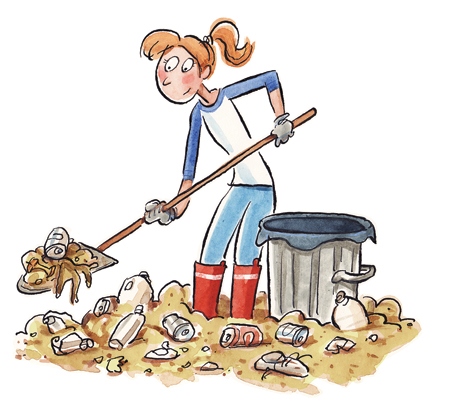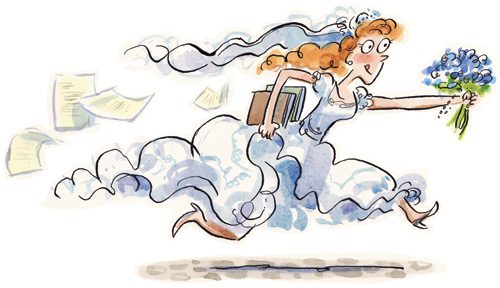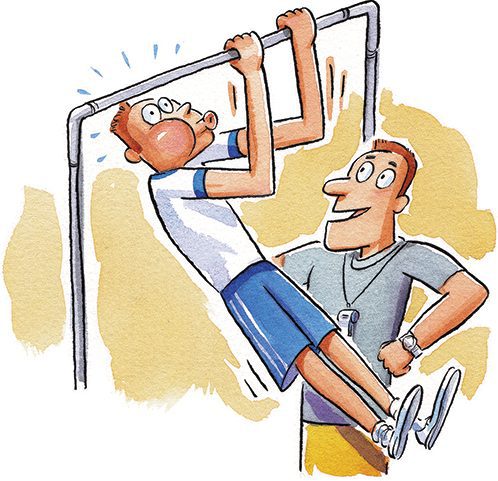Readers recall the simple acts of service that added meaning to their BYU experience.
Earlier to Rise
By Laurie Harris Wirz (BA ’96), Centerville, Utah
When I started my education at BYU, I was the only one in my apartment who worked. Every morning I got up at 5:15, rushed to eat breakfast, get dressed, and trudge up the cold, dark hill to do custodial work at the MTC. It was tough being the only employed person in my apartment, especially since social activities typically went on late into the night. Going to bed early for work, I often missed out. After a few months, I was becoming discouraged.
Then one morning I found a candy bar and a note—with my name on it—taped inside the front door. The note included a quotation from a General Authority about getting through trials and concluded with some kind words about me. It was signed with a question mark. I cried all the way to work that day, so grateful that someone cared enough to wake up even earlier than me to make my day better.
In the ensuing months, similar notes followed, always encouraging, always anonymous. I tried to discover the sender but never figured it out. Still, I will forever be grateful for the unselfish person who put serving me above her need to sleep. It may have seemed like a little thing to her, but for me, lonely and discouraged, these acts of loving-kindness changed my entire experience that year.
A Building Worth Saving
By Shirah Madsen McDonald (BA ’92), Danville, Calif.
One frosty Saturday morning in early November, my roommate dragged me out of bed at 6 a.m. She had signed us up to clean out the BYU Academy, part of a last-ditch community effort to save the building from demolition. I didn’t know much about the building except that my mom had taken classes there. The Academy was in severe disrepair; years of squatters and transients had taken their toll.
Upon our arrival organizers handed us shovels and directed us to the basement. On such a gray day, the basement was dark, with only a few ember lamps lit. I remember opening a door and finding garbage up to my knees (hence the shovels). We got to work, spending more than two hours removing debris.
Finally, someone suggested we go upstairs. At the top of the staircase, I felt as if I had stepped into a time capsule: I found myself in what had once been a grand ballroom, all blond wood and columned. A wisp of Barbra Streisand singing “All I Ask of You” from Andrew Lloyd Webber’s Phantom of the Opera echoed through the room. I looked out the arched window and saw that it was snowing lightly. In that perfect moment, I understood why the Academy needed saving, why it was necessary to preserve it for the generations of students and faculty who had lived, learned, and loved here.
One of 3,000
By James H. Bean (BA ’62), Oregon City, Ore.
As a new BYU student in the fall of 1952, I experienced two examples of service that touched my heart. When I arrived at the Trailways Bus Station on the corner of First North and University for the start of the fall quarter, I was totally lost, all alone, with no money and no idea where campus was. Then a young man named Ben came over and asked if I needed help. He helped me with my luggage and took me up to the registration office. I was grateful for this welcome to BYU.
Three weeks later, there was a knock at my apartment door at about 11 p.m. A young man introduced himself as Scott A. Speakman (BS ’53), a fellow student at BYU and president of the Church’s student branch. He had noticed that I had not attended any branch meetings during the three weeks I had been at BYU and wanted to know if I was alright. I explained that I had been attending the local ward located next door to my apartment. I later learned the BYU Student Branch had more than 3,000 members—so I was much impressed at Scott’s effectiveness, dedication, and example of magnifying his calling. He had sought out one who—as far as he could tell—might be slipping into a state of inactivity.
The memory of these kindnesses has remained a strong influence for good in my own life ever since.
Swimming and Sisterhood
By Laurie Jo Biegler Steflik (BA ’81), Elko, Nev.
I was really maxed out this particular year with a heavy class load. Feeling a need to offer service, I rather grudgingly signed up to help teach swim lessons across the street at the high school.
On the first day, I was surprised to come face-to-face with the supervisor, an acquaintance and rival from my student ward. We had never been outwardly antagonistic, but a sense of competition had kept us at odds. She coolly advised me that they didn’t really need me but added that volunteers were always welcome.
The first few days I watched as she struggled with an obstinate and frightened preschooler. The blonde little urchin would not blow bubbles, put her face in the water, or let go of the railing. The more they pleaded and demanded, the more hysterical she became.
Finally, they turned to me as a last resort. I figured we might as well have fun. We sang and played and generally messed around for half an hour each morning. In the end the little darling was laughing, giggling, and loving the water. And I was enjoying myself too, so much that I worried about retribution from my rival. But as it turned out, she was a kind and humble person. In fact, she passed along a huge compliment from the child’s mother, thanking me for turning the swimming experience around for her daughter. Any animosity between my supervisor and me dissolved into a sweet sisterhood that warms my heart still.
Senior Moments
By Pamela Pierson Portz (BSW ’85), Woodinville, Wash.
While a student, I volunteered at a local convalescent center, where I found deep meaning in opportunities to reach out. To an undergraduate dealing with debilitating homesickness and depression, service lifted me and allowed me to feel God’s love.
One day I discovered that my new friend at the center, Christie Lund Coles, a celebrated Utah poet, had been friends with my great-grandmother, also a poet. I was delighted as she shared her memories and poems with me, and I marveled at how she found beauty in her surroundings. She had lost neither her vision nor her voice, and, in her poem “I Am in a Rest Home,” she found meaning in spite of circumstances. She reflected that “some spring returning will find me gone.” I remember these verses some 30 years later and still feel humbled by the largeness of her soul.
At Christmas I caroled to the residents and delivered a snowman card to one particularly quiet man. To my surprise, as I sang “Silent Night” and handed him his card, he began to sob. I learned that day that all can be calm and bright when we love one another.
Called to Serve
By Carli Isaacson Bartling (BA ’94), Portland, Ore.
With challenging classes and a nonexistent social life, I was having a particularly difficult junior year at BYU. After many prayers and pleadings for help, I felt I should ask my home teachers for a blessing. However, I was too embarrassed to call them or go their apartment to ask. Instead, I prayed that Heavenly Father would send them to me.
I didn’t really expect anything would come of my prayer. But then, not 30 minutes later, I heard a knock on the door. To my surprise, it was one of my home teachers. He didn’t ask for anyone else—just me. He had felt impressed to visit. After we discussed my concerns and feelings, he gave me a priesthood blessing that brought me the comfort and strength I needed to carry me through the rest of the semester.
My home teacher was in tune to the Spirit, and he wasn’t so caught up in his own life and education that he missed the call for help.









